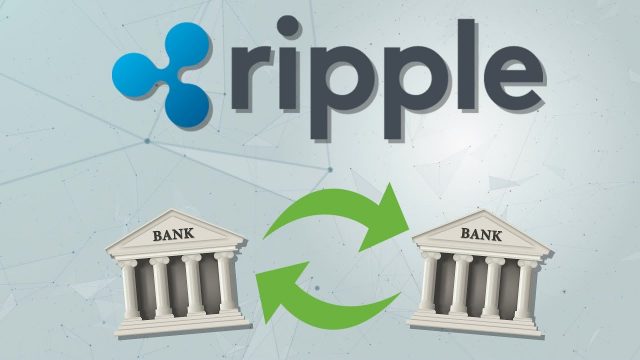
How Ripple (XRP) Threatens Banks

Ripple (XRP) – Cryptocurrency had existed for some time enough to say it is no more new or weird to the market. Although it might be volatile with fluctuating market value but it has shown indefectible or unflinching potential that, it has come to stay ever than foot racing.
Prior to this time, when transaction difficulties rose up, we perceived transactions, especially cross-border fund transfer, as a rocket science or something with great difficulties. Not long, the emergence of MoneyGram, Western Union, and the likes came, and people resorted to using it to facilitate their transactions better in a safer, easier, faster, and a more dependable way. Still, most of the transactions are done in the bank.
Then, both remittance companies seem like the best and superlative transaction means we could ever have. The trend continued and we relied more on the two firms not knowing that we are yet to perceive anything near the best.
Later, the world is becoming revolutionized, the advent and usage of technologies like mobile phone and internet were across the nooks and crannies of the biosphere when people could actually send messages to their loved ones from distant places as far as Australia and then receive the messages in milliseconds. At this time, a new technology rose up, challenging the former, separating most cross-border transactions away from banks involvement to make the game more interesting for people.
The whole thing seem like a miracle, people got puzzled about the possibility of receiving fund without going to banks but it actually came to reality and people began to transact through PayPal, Payeer, and the likes.
Wow, people wallow in triumph, we do not need to get to the bank to run a transaction, banks and other authority do not get to see us when making transactions. People sent kudos to the remittance networks, as if it has no flaws or dent, surely this was never the end.
Later faultfinders stood up to identify the networks’ shortcomings. They told the world that the networks are centralized, one cannot run transaction with anonymity, transaction chargers are quite enormous, and the shortfall of limited minimum transaction amount and others. The time of blockchain then prevailed.
Blockchain technology is a network that records it transactions using distributed databases, math and cryptography.
Blockchain technology is a decentralized network that stays away from all forms of regulations, making anonymous transaction a piece of cake for people around the world. People began to embrace the technology, and developers came up with cryptocurrencies, with the first of its kind being Bitcoin. Bitcoin coasted people’s mind and received endorsement, giving room for the advent of new cyptocoins.
Of all the altcoins, Ripple(XRP) stood out to make cross-border transaction a road to Damascus, leaving banks and other financial institutions with no choice than to collaborate when they saw the proficiency of the altcoin.
Ripple connects banks, payment providers, digital asset exchanges and corporates via RippleNet which provides one frictionless experience to send money globally.
How Ripple Threatens Bank.
People are beginning to lament over some of the archaic banks’ means of running transactions across the world, especially when comparing bank remittance speed which is like the speed of snake to cryptocurrency like Ripple’s, that is as fast as the speed of light.
People are now calling for the deepening of banks into obscurity while raising Ripple into limelight for use.
These are shreds of evidence some observers and analyst saw to opine that Ripple possesses treat to banks.
The co-head of corporate and investment banking at Deutsche Bank, Marcus Schenck, opines that bank accounts might vanish in couple of years.
“The week before last I was in China, and saw a company that is producing microchips that are used for bitcoin mining, or any type of blockchain technology,” he told Bloomberg.
“There’s a thesis that at some stage in 5, 10, 15, 20 years — who knows — accounts will disappear, and be replaced.”
When listening to the speech of high profile bankers on their views about cryptocurrency, one should be prepared to hear that “banks are making all means to wreck cryptocurrency out of the financial industry”.
Then you will begin to wonder why such statement would be exuded. But when you look at the methods which cryptocurrencies use in transacting, we’ll perceive that they pose threat to banks.
In the same line, Shidan Gouran, the President, and COO of Global Blockchain said “If big banks were to succeed in crushing one of these two currencies, Ripple would be it,”
“The main reason for this is because Ripple is much more of a direct competitor to banks. Because it operates more like a transaction network than a currency, it’s a lot more plausible that they will be a target for banks to get tough with. Whereas because Bitcoin operates more like a currency, they don’t pose the same threat.”
Musing over the speech of leader Jamie Dimon, the CEO of J.P. Morgan Chase & Co., an American multinational banking system and the largest bank in America, when he tagged digital currencies as “fraud,” and a “tulip bulb,” one will realize that despite banks’ collaboration with Ripple, they see the currency as threat and they are ready to combat it, they are partnering with the coin for now only because they are left with no choice.
Ripple, with its tools, is showing much capability of burying banks as it operates more like banks in a better way.